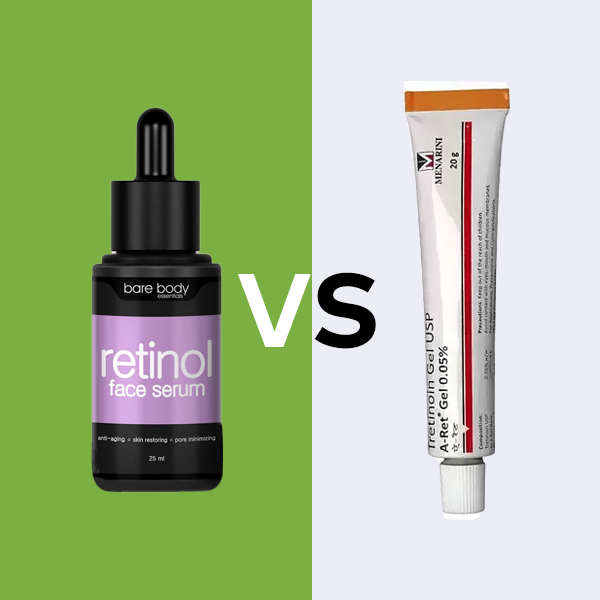Introduction:
Tretinoin and retinol are both powerful skincare ingredients that fall under the umbrella of retinoids, known for their ability to promote skin renewal and improve various skin concerns. Understanding the differences between these two compounds is essential for selecting the right one for your skincare needs.
Difference b/w Tretinoin and Retinol
Tretinoin (Retinoic Acid):
Tretinoin requires consistent and long-term use for optimal results. When you get tretinoin online, it’s necessary to follow the recommended application guidelines and maintain a regular skincare routine to experience the full benefits of this potent retinoid. Here are some points that will help you.
- Tretinoin is a prescription-strength retinol derived from vitamin A.
- It is the active form of retinoid and works directly on the skin cells.
- Known for its potency, it is often prescribed to treat acne and reduce the appearance of wrinkles and hyperpigmentation.
Retinol:
- Retinol is an over-the-counter (OTC) derivative of vitamin A.
- It needs to undergo conversion in the skin to become retinoic acid, the active form.
- Retinol is generally milder than tretinoin, making it suitable for those with sensitive skin.
How much Tretinoin & Retinol are available and accessible:
Tretinoin:
- Requires a prescription, and its use should be supervised by a healthcare professional.
- Available in various concentrations to tailor the treatment to individual needs.
Retinol:
- Over-the-counter and available in a variety of skincare products.
- Products range in strength, allowing users to choose based on their skin sensitivity and needs.
Effectiveness of Tretinoin & Retinol:
Tretinoin:
- More potent and typically delivers faster results.
- Proven to be effective in treating acne, reducing fine lines, and improving skin texture.
Retinol:
- Takes longer to show results compared to tretinoin.
- Effective in improving fine lines, wrinkles, and skin texture, but results may vary.
Side Effects of Tretinoin & Retinol:
Tretinoin:
- May cause more pronounced side effects, including redness, peeling, and dryness.
- Requires a gradual introduction to minimize irritation.
Retinol:
- People with sensitive skin are generally more likely to tolerate it.
- Side effects such as irritation and dryness are usually milder compared to tretinoin.
Cost Considerations of Tretinoin and Retinol:
Tretinoin:
- Prescription-based, and cost may vary depending on insurance coverage.
- Generic versions are often more affordable.
Retinol:
- Available in various price ranges, with OTC products catering to different budgets.
- Higher-end formulations may contain additional skincare ingredients.
Which is the Right Option for You:
- Consider Skin Sensitivity:
If you have sensitive skin or are new to retinoids, starting with a lower-strength retinol may be advisable.
- Skin Concerns:
Tretinoin is often preferred for more severe skin concerns, such as acne or deep wrinkles, while retinol may be suitable for preventive care and milder issues.
Benefits of Tretinoin and Retinol:
- Acne Treatment
- Anti-Aging Properties
- Hyperpigmentation Treatment
- Improved Skin Texture
- Sun Damage Repair
Before Get Tretinoin Consult with Dermatologist:
Always consult with a dermatologist or skincare professional before incorporating retinoids into your routine, especially if considering tretinoin.
Conclusion:
In the tretinoin vs. retinol debate, the choice ultimately depends on your skin type, concerns, and tolerance. Both can be powerful additions to your skincare routine, but a personalized approach is crucial for optimal results. Whether seeking a prescription-strength solution or a gentler over-the-counter option, achieving healthier, more radiant skin is possible with the right retinoid for your needs.
Reference:
https://medlineplus.gov/ency/article/002400.htm
https://www.webmd.com/beauty/retinoid-gel-and-cream-treatments#
https://www.ncbi.nlm.nih.gov/pmc/articles/PMC6791161/
https://www.ncbi.nlm.nih.gov/pmc/articles/PMC6791161/
https://www.mayoclinic.org/drugs-supplements-vitamin-a/art-20365945
https://rarediseases.org/rare-diseases/fetal-retinoid-syndrome/
https://www.ncbi.nlm.nih.gov/pmc/articles/PMC5595600/
https://my.clevelandclinic.org/health/treatments/23293-retinol
